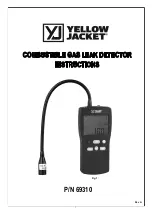
9
ENGLISH
GAS ALARM
GAS ALARM
Placing of the sensor for
city and natural gas (methane CH4):
Mount the external sensor at a height of 15-30 cm
below the ceiling but no further than 4 m from the
gas appliance. Note that the sensor must be moun
-
ted above the highest door or window opening in the
room.
City and natural gas (methane) are lighter than air
and will therefore always rise.
Placing of the sensor for liquefied gas (propane
C3H8 / butane C4H10):
Mount the external sensor at a height of 15-30 cm
above the floor but no further than 4 m from the gas
appliance. Escaping liquefied gas is heavier than air
and sinks to the floor. It spreads across the floor rat
-
her like water - but as a gas - and always seeks the
lowest point.
The sensor may not be used in the following positions:
places where the sensor is shielded from escaping gas (e.g. behind curtains or in
•
cupboards)
directly above hearths or points of combustion or over a wash basin or sink
•
next to a door, windows, ventilator, fan, air conditioning unit etc.
•
in areas where dust or dirt can prevent the sensor from working
•
in areas at risk of explosion.
•
START-UP
The GAS ALARM GX-B2 is simply plugged into a 230V/50Hz socket. The LED indicator
(Function) will light up
yellow
. The sensor of the monitoring system requires a warm-up time
of 3-5 minutes to become fully operational. The LED indicator (Function) will then light
green
and the GAS ALARM GX-B2 is operational.
NOTE:
various transport conditions (lengthy storage / humidity) can lead to an alarm state
being triggered immediately after the warm-up time (LED flashes
red
). Disconnect the unit
briefly from the supply and start the warm-up process again. You may need to repeat this
procedure up to three times.










































